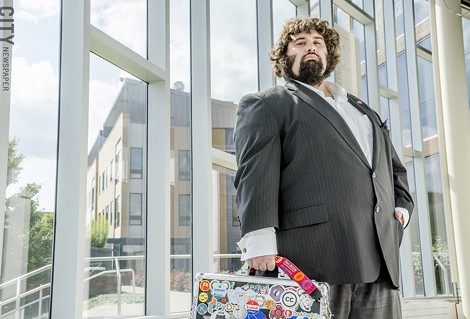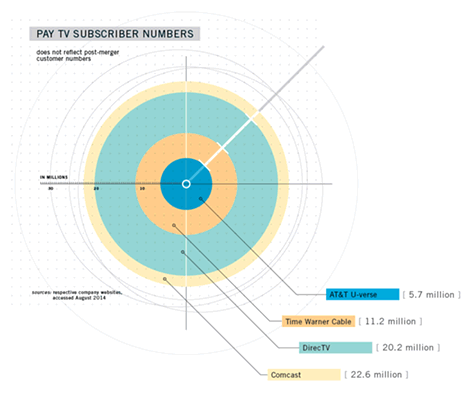Comcast-Time Warner deal in regulators' hands
Can it be stopped?! Should it be stopped?!
By Jeremy Moule @jfmoule[
{
"name": "500x250 Ad",
"insertPoint": "5",
"component": "15667920",
"parentWrapperClass": "",
"requiredCountToDisplay": "1"
}
]
Critics tend to talk about corporate mergers the way they talk about B-movie monsters.
And why not? Sometimes, corporations are like the Blob: constantly growing, swallowing up everything in their path. Some get so big that entire cities are at their mercy.
So it goes with the proposed Comcast-Time Warner Cable merger.
If approved, the merger would make Comcast, already the largest pay TV and broadband Internet provider in the country, even bigger. And directly and indirectly, the deal would influence what Rochesterians see on their televisions and how they access the Internet, as well as what they pay for both. Whether the changes would be for better or for worse is an open question, though many consumer advocates, good-government groups, and members of the public expect the worst.
"In this situation, where we're dealing with behemoth telecommunication companies, the consumer and the public interest tend to get completely overlooked, and it's all about what's most profitable for this gargantuan entity," says Susan Lerner, executive director of Common Cause New York, which opposes the merger.
Under the terms of the deal, Comcast would swallow up Time Warner Cable through a $45.2 billion all-stock deal. Instead of cash, Time Warner Cable stockholders would get shares in the new, bigger Comcast. The proposed merger, which the companies announced in February, still has to clear regulatory reviews at the state and federal levels, as well as a federal antitrust review.
If the merger happens, approximately 30 percent of pay TV subscribers in the country would be Comcast customers. Comcast and Time Warner are already the top two providers of broadband Internet in the country. So a bigger Comcast would hold an even larger share of that customer base.
Comcast and Time Warner naturally put a positive spin on the potential consolidation. They say the new, bigger Comcast would have resources to improve its network and services and to expand its infrastructure into underserved areas.
The company would also be in a better position to compete against its national peers, such as Dish, DirecTV, Verizon, and AT&T, Comcast says in factsheets on the merger.
But what Comcast and Time Warner Cable like about the merger is also the reason critics and consumer advocates say that the deal shouldn't happen.
The new company would be too big, they say, and the public would pay the price: The new Comcast would have too much negotiating power, would be difficult to regulate effectively, and could become a television and digital content gatekeeper. One of the critics' biggest concerns is Comcast's support for the idea of Internet fast lanes, which would allow Internet providers to charge online services for faster access to customers.
Critics say the bigger companies could better afford to pay for that access, while smaller companies and startups would be stuck at base-level speeds. The Internet is supposed to be a level playing field, and the arrangements could stifle innovation, they argue.
Opponents of the deal also fear that the merger would trigger a new wave of telecommunications and media consolidation. Soon after the Comcast-TWC deal was announced, AT&T and DirecTV announced their own merger plans. AT&T would purchase the satellite television provider for $48.5 billion, though the deal also requires federal regulatory and antitrust approvals.
Like Comcast, AT&T sees the acquisition as a matter of content and delivery. But it also sees the acquisition as a way to compete with cable.
"It really shows one of the biggest problems with these mergers, which is it creates an arms race," says John Bergmayer, a senior staff attorney with Public Knowledge, a tech policy advocacy group opposed to both mergers.
When the distributors and cable companies start merging, Bergmayer says, the content companies begin to worry about the providers' buying and negotiating power. And they start making consolidation moves, too, he says. For example, Fox recently made an $80 billion offer to Time Warner Inc. (which is a separate company from Time Warner Cable). Time Warner rejected the bid and Fox executives have since halted efforts to woo the studio.
"Because these mergers tend to come in waves and each one justifies the next one, that's a very important reason why you really have to stop the first one," Bergmayer says. "You really can't just wave mergers through, as regulators sometimes want to do."
At the federal level, the Comcast-Time Warner Cable merger requires licensing approvals from the Federal Communications Commission and antitrust clearance from the Department of Justice.
Right now, opponents are focused on the FCC's review. The commission is taking comments on the proposed merger through August 25, and it will consider public input and petitions as part of its decision-making. Comments can be submitted via e-mail to [email protected].
A handful of states are reviewing the merger as well, since the deal involves the transfer of cable infrastructure from one company to another. In simple terms, state utilities regulators have to give Comcast permission to assume Time Warner Cable's local or state cable franchises.
So for Comcast to take over Time Warner Cable's New York operation, for example, it needs the approval of the state's Public Service Commission. And to get that approval, Comcast has to convince the commissioners that the deal is in the public's interest.
In presentations at PSC public hearings, Comcast executives laid out the company's contributions to the state. It added jobs in New York after acquiring NBCUniversal in 2011, they said, and brought production of some television programs — including the Tonight Show — back to New York City.
They also tout the company's plans to invest in and upgrade Time Warner's systems, though they haven't specified how much Comcast plans to invest. And the executives play up a Comcast program that gives low-income households access to cable Internet; that program, however, has very narrow criteria for who qualifies.
New York's review is crucial for the merger as a whole, since Time Warner operates in the lucrative New York City market. Comcast is very interested in that foothold, just as it's interested in Time Warner's Los Angeles and Dallas subscribers.
Opponents have said that if the New York PSC rules against the merger, the deal could fall apart. So consumer and progressive groups have focused on the PSC's review. The PSC's comment period has closed, but the commission will continue accepting submissions throughout the review; its decision is expected in October. Comments can be sent to [email protected].
The commission has received close to 3,000 comments on the proposed merger; the vast majority oppose it, though many of them appear to be form letters. Many of the opponents say that they've had lousy customer service from either Time Warner or Comcast. And they express frustration with the lack of cable competition in New York, particularly with regard to high-speed Internet service.
Supporters of the deal — mostly charities and nonprofits that get support from Comcast, as well as some business groups — have also submitted comments to the PSC.
Comcast and its critics take a different view of what constitutes competition.
During a conference call with investors, Comcast chair and CEO Brian Roberts said that the deal "will not reduce competition in any relevant market" since Comcast and Time Warner don't compete in any ZIP code. In other words, the company claims the deal won't decrease competition in local markets because cable companies don't compete within them anyway.
Comcast execs say that the company is concerned with competition at the national scale. If it serves more customers, especially those in key markets, it'll be able to negotiate favorable terms for content, including cable channels and the online services that make heavy use of its Internet networks, they says.
But Comcast has its own programming interests to protect, since it owns NBCUniversal. And some consumer watchdogs worry that the bigger company would use its leverage to promote its own programming or provide that content with an advantage on Comcast's systems.
That sort of behavior could be subtle, at least to the public. Common Cause's Lerner points to a legal battle between Bloomberg TV and Comcast as an example. Bloomberg TV is a competitor of Comcast-owned CNBC, and at one point a few years ago, Comcast moved Bloomberg away from other news channels on the cable lineup. The FCC intervened and ruled that Comcast had to put Bloomberg back with the other news channels.
"It was done deliberately, even though they promised when they bought NBC they would never do that," Lerner says.
The company also has a big interest in bundling, or putting together packages of channels and services. In theory, the packages are supposed to give consumers an easy way to buy programming or services they want. In practice, companies use the practice to force consumers into paying for things they don't want just to get the few options they desire.
Public Knowledge's Bergmayer says his concern with mergers isn't what the company would do in the next year or what it's done in the past. Instead, regulators ought to consider whether the merger creates financial incentives for the company to engage in behaviors that aren't good for consumers. For example, would its size and distribution channels give it clout to negotiate a higher price for its products and services, while cutting what it's willing to pay for content from other networks and studios?
Consumers tend to think about competition in terms of customer service and options. If they're unhappy with a product or service, they want to be able to buy it from someone else. In the video market, they can do that to a degree, if they're willing to switch from satellite to cable. Most consumers have little choice for high-speed Internet and are stuck with the cable company as their provider.
Because consumers know they'll be stuck with Comcast as their Internet provider, many are concerned about what the company might charge for Internet access. And some users and consumer advocates are concerned with how the company might treat data traffic on its networks.
At the same time that the FCC is reviewing the proposed Comcast-Time Warner merger, it's also advancing a net neutrality proposal.
Net neutrality is the concept that Internet providers should treat all data equally, regardless of the source. But the FCC's proposed open Internet rules would allow paid prioritization of data and content. That's the "fast lane," where online companies – think digital video services – pay Internet providers for faster connections to their mutual subscribers.
The public seems to hate that idea. The FCC has received more than 1.1 million comments on its open Internet proposal — many ripping the fast-lane component.
In comments submitted to the FCC, Comcast executives say they support the concept. They add, however, that the company doesn't have any existing fast-lane agreements, nor does it plan to enter any.
But post-merger Comcast would be the biggest broadband provider in the country. And if it did start entering into fast-lane agreements, other broadband providers would probably follow suit.
That very scenario played out after a recent spat between Netflix and Comcast. The whole thing had to do with how Comcast was routing Netflix's data; the problem is technically different from the fast-lane issue, though it sounds similar.
Netflix had repeatedly complained that the way Comcast routed its traffic affected streaming video performance in subscribers' homes. Ultimately, Netflix agreed to pay Comcast, and the cable company agreed to fix the problem. The details of the deal weren't made public, but Comcast issued a statement that characterizes the arrangement as a direct connection that'll allow the streaming video provider's traffic to grow.
Netflix has since signed similar deals with AT&T, Verizon, and other providers. It's a safe bet that each deal is costing Netflix, and presumably the costs will eventually get passed along to its subscribers.
Internet fast lanes amount to double-charging broadband subscribers, says Remy DeCausemaker, free and open-source software research coordinator at the Rochester Institute of Technology's MAGIC Center. Broadband subscribers already pay for the data they use, and online services would likely pass along any added cost from a fast lane agreement, he says.
And the concept – along with data caps – clashes with the widely held vision of the Internet as a level playing field for innovation and the exchange of ideas, he says.
"Fundamentally, the idea that certain kinds of speech are more valuable than others is hard to deal with," DeCausemaker says. "You never know what will inspire someone. You never know what will inspire the next invention."
The Comcast-Time Warner merger is not a done deal, and it has equal chances of clearing and failing state and federal reviews.
But New York regulators have already signaled the approach they may take. In a brief filed earlier this month, Public Service Commission staff recommended approving the deal, but with conditions. The staff says it sees "no net positive benefit as a result of the proposed merger absent specific additional commitments and conditions."
The staff wants Comcast to implement stronger programs for providing broadband to low-income households. It also wants the company to preserve Time Warner's existing $14.99 per month cable Internet package, which is available to all of the company's subscribers.
And it recommends that the commission impose a condition holding Comcast to customer service improvements. The company should work with the PSC to set targets for improving an independent customer service satisfaction score, the PSC staff says. And for any year the company misses those targets, it should pay $5 million into a state public benefit program, the staff says.
Comcast execs have promised the commission that the company will invest in and expand networks within the state. But the PSC staff wants to see specifics on the planned investment. The staff also says Comcast should commit to $50 million in investments to extend service to areas without service, including rural communities and industrial parks.
Comcast has already said that it'll jettison approximately four million subscribers, though it hasn't said from what market or markets. It'll turn those subscribers over to Connecticut-based Charter Communications. Documents and statements on the deal make it clear that Comcast is taking the step to address antitrust concerns.
But critics caution that once the company is allowed to merge, it'll have little incentive to follow through on any conditions.
"They will say whatever they need to say to get the regulatory approval, and then they have the market power to do whatever they please," Lerner says.
Ensuring access
The public's interest in the proposed Comcast-Time Warner Cable merger has centered on matters of competition, consumer costs, and customer service.
But local cable access channels are caught up in the deal, too. Across the state, people involved with the stations are questioning the support that Comcast would have for the operations, says David Renner, coordinator for the Town of Penfield's community and government access channels.
"We just don't know," Renner says. "There's a lot of speculation from what's happened in the past."
The deal could present opportunities for the stations, Renner says. For example, Comcast upgraded some community access channels in New England states to high-definition signals, he says.
As long as the existing stations don't lose funding through the merger, they'll likely continue operating, he says.
Federal laws require cable providers to make channels available for non-commercial use. It's up to franchising authorities — in New York, those are local governments — to decide whether they want to use them.
In New York, communities used to get a larger franchise fee from cable providers if they had a community access station, says John Schroth, station director for East Rochester Community Television. But state law changed a few years ago and that incentive was eliminated.
Schroth says that he's not too worried about the fate of East Rochester's station since it has a dedicated core of volunteers and viewers.
But Schroth and Renner say that anyone who values community access channels should submit comments to the Federal Communications Commission and the State Public Service Commission.
This article has been corrected
Speaking of...
-

GateHouse and Gannett agree to merge
Aug 5, 2019 -

GateHouse and Gannett talk consolidation
Jul 24, 2019 -

Feedback 11/9
Nov 9, 2016 - More »
Latest in News
More by Jeremy Moule
-

ROCHESTER TEN
ANNETTE RAMOSAug 1, 2023 - More »










